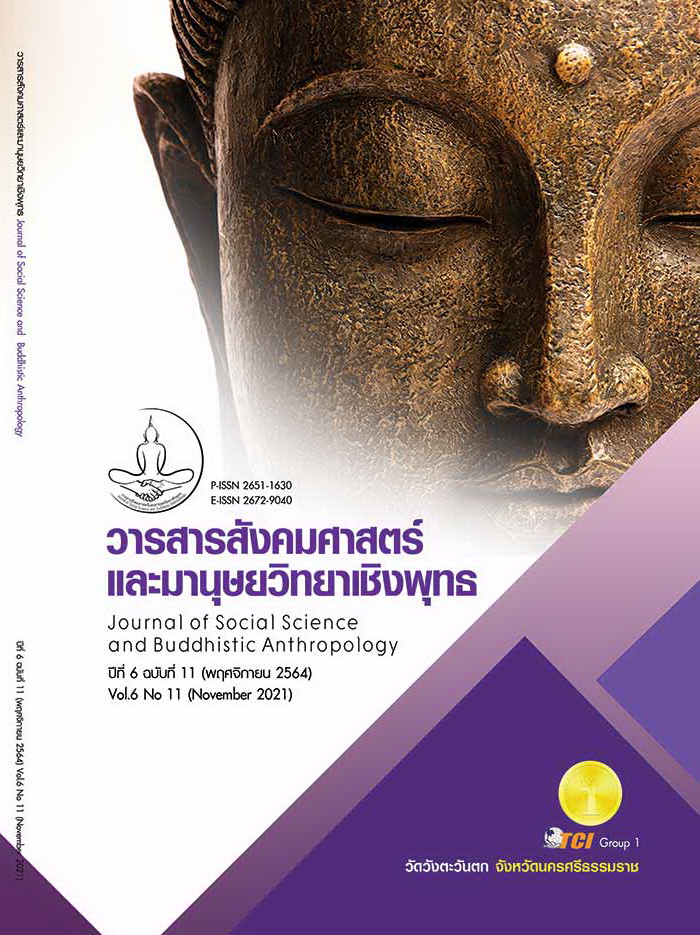ABORTION LAW AND ETHICS IN THAI SOCIETY
Keywords:
Abortion Law, Ethics, Thai SocietyAbstract
Abortion is the intentional removal of the baby from the mother's womb prematurely, which ends the life of the fetus in the mother In past. In the Thai Society, there was no law allowing pregnant women to have free abortions. Due to moral constraints, religious belief is against the tradition of society. However, there is a new law allows pregnant women to express their intention to terminate their pregnancy within the framework of the law. According to the Penal Code no 28 B.E. 2021, Section 301 and Section 305, It said that a woman of less than 12 weeks gestation is legally able to terminate the pregnancy, and article 305 provides for an abortion without offense, as follows: (1) It is necessary to act because of a problem with the woman's physical or mental health. (2) It is necessary to act because there is a risk that the fetus will be born with severe disabilities. (3) pregnant women due to sex offenses; (4) women whose gestational age is less than twelve weeks willingly terminate the pregnancy. (5) A woman whose gestational age exceeds twelve weeks but not more than twenty weeks Willingly terminate the pregnancy after consultation. If we focus on the ethical point of Thai society, it is contrary to morals, ethics, culture, and traditions. Because when a baby is born in the mother's womb, it can be considered that the life has been already occurred. Even legal, it is not considered to be a person. Therefore, it has proved that the enactment of this law is unethical in Thai society.
References
กระทรวงสาธารณสุข. (2564). หลักการในเรื่อง “การตรวจและรับคำปรึกษาทางเลือก” ตามมาตรา 305 (5) แห่งประมวลกฎหมายอาญา. เรียกใช้เมื่อ 14 ตุลาคม 2564 จาก https://tmc.or.th/Media/media-2021-07-07-09-38-37.pdf
เกียรติขจร วัจนะสวัสดิ์. (2564). ประเด็นปัญหากฎหมาย “ความผิดฐานทำให้แท้งลูก” ตาม ป.อ. มาตรา 301 และมาตรา 305 (แก้ไขเพิ่มเติม 2564) หน้า 1-18. เรียกใช้เมื่อ 17 มิถุนายน 2564 จาก https://drive.google.com/file/d/1a6v5ZyUwAAWJnMzxMpHUEW JjT6SbrpV1/view
จิราภรณ์ เมนะพันธุ์. (2538). สาเหตุ กระบวนการ และผลกระทบของการเป็นมารดาวัยรุ่น: กรณีศึกษา มารดาวัยรุ่นนอกสมรสในสถานบริการเอกชน. ใน วิทยานิพนธ์ศึกษาศาสตรมหาบัณฑิต สาขาประชากรศึกษา. มหาวิทยาลัยมหิดล.
เฉลิมพล ประทีปปะวณิช. (2520). ทฤษฎีการเมืองแห่งนวสมัย พระนคร. กรุงเทพมหานคร: โรงพิมพ์มหาวิทยาลัยรามคำแหง.
เชิดชู อริยศรีวัฒนา. (2564). พระราชบัญญัติประมวลกฎหมายอาญา (ฉบับที่ 28) 2564. เรียกใช้เมื่อ 14 ตุลาคม 2564 จาก http://www.wongkarnpat.com/viewpat.php?id=2974
ทวีเกียรติ มีนะกษิษฐ และรณกรณ์ บุญมี. (2564). คำอธิบายกฎหมายอาญา ภาคความผิดและลหุโทษ. (พิมพ์ครั้งที่ 18). กรุงเทพมหานคร: บริษัท สำนักพิมพ์วิญญูชน จำกัด.
ธีรพร วุฒยวนิช. (2535). ตำราสูติศาสตร์. เชียงใหม่: มหาวิทยาลัยเชียงใหม่.
บ้านจอมยุทธ. (2543). จริยธรรมของคนไทย. เรียกใช้เมื่อ 28 มีนาคม 2564 จาก https:// www.baanjomyut. com/library_3/extension-2/ethics/07.html
ปรีชา เพชรรงค์. (2520). ปัญหาจริยธรรมอันเกี่ยวเนื่องกับการทำแท้ง. ใน วิทยานิพนธ์อักษรศาสตร มหาบัณฑิต สาขาปรัชญา. จุฬาลงกรณ์มหาวิทยาลัย.
พระราชบัญญัติแก้ไขเพิ่มเติมประมวลกฎหมายอาญา (ฉบับที่ 27) พ.ศ. 2562. (2562). ราชกิจจานุเบกษา เล่มที่ 136 ตอนที่ 69 ก (27 พฤษภาคม 2562).
พระราชบัญญัติแก้ไขเพิ่มเติมประมวลกฎหมายอาญา (ฉบับที่ 28) พ.ศ. 2564. (2564). ราชกิจจานุเบกษา เล่มที่ 138 ตอนที่ 10 ก (6 กุมภาพันธ์ 2564).
พระสุรินทร์ อินฺทวํโส (อาจนิลพัฒน์). (2555). การทำแท้งในสังคมไทย: ปัญหาและทางออก ตามทัศนะของพระพุทธศาสนา. ใน วิทยานิพนธ์พุทธศาสตรมหาบัณฑิต สาขาวิชาพระพุทธศาสนา. มหาวิทยาลัยมหาจุฬาลงกรราชวิทยาลัย.
มูลนิธิโครงการสารานุกรมไทยสำหรับเยาวชน. (2561). สารานุกรมไทยสำหรับเยาวชนฯ เล่มที่ 9 เรื่องที่ 4 การทำแท้ง ความหมายของการแท้ง. เรียกใช้เมื่อ 28 มีนาคม 2564 จาก https://www.saranukromthai.or.th/sub/book/book.php?book=9&chap=4& page=t9-4-infodetail 01 .html
ราชบัณฑิตยสถาน. (2542). พจนานุกรมฉบับราชบัณฑิตยสถาน 2542. กรุงเทพมหานคร: พิมพ์ที่นานมีบุ๊คพับลิบเคชั่นส์.
วิเชียร ดิเรกอุดมศักดิ์. (2564). กฎหมายอาญาพิสดาร เล่ม 2. กรุงเทพมหานคร: ห้างหุ้นส่วนจำกัดแสงจันทร์การพิมพ์.
สมหมาย ถุงสุวรรณ. (2527). นรีเวชวิทยา. (พิมพ์ครั้งที่ 2). กรุงเทพมหานคร: มหาวิทยาลัยมหิดล.
สมหมาย ถุงสุวรรณ. (2555). อุบัติการณ์ของการแท้งและการทำแท้ง. เรียกใช้เมื่อ 28 มีนาคม 2564 จาก http://guru.sanook.com/encyclopedia
สมาคมวางแผนครอบครัว. (2521). ทำแท้งเสรีช่องว่างระหว่างศีลธรรมกับปัญหาทางสังคม. ใน เอกสาร ประกอบการสัมมนาประชากรจัดทำโดยสภาวิจัยแห่งชาติ 24 สิงหาคม 2521. สภาวิจัยแห่งชา.
สุชา จันทร์เอม. (2531). จิตวิทยาทั่วไป. กรุงเทพมหานคร: ไทยวัฒนาพานิช.
สุดสงวน สุธีสร. (2547). อาชญาวิทยา. (พิมพ์ครั้งที่ 2). กรุงเทพมหานคร: สำนักพิมพ์มหาวิทยาลัยธรรมศาสตร์.
หยุด แสงอุทัย. (2520). กฎหมายอาญาภาค 2. กรุงเทพมหานคร: โรงพิมพ์มหาวิทยาลัยธรรมศาสตร์.
อรรถสิทธิ์ สุนาโท. (2553). มุมมองทางปรัชญากับปัญหาการทำแท้งในสังคมไทย. วารสารศิลปะศาสตร์ปริทัศน์, 5(10), 79-92.
iLaw. (2564). เปิดกฎหมายอาญาแก้ไขใหม่ ทำแท้งปลอดภัยได้ในอายุครรภ์ 12 สัปดาห์. Retrieved กันยายน 2, 2564, from https://ilaw.or.th/node/5816
Kapook.com. (2564). ทำแท้ง. Retrieved March 28, 2564, from http://icare.kapook.com /abort_ content1.php









